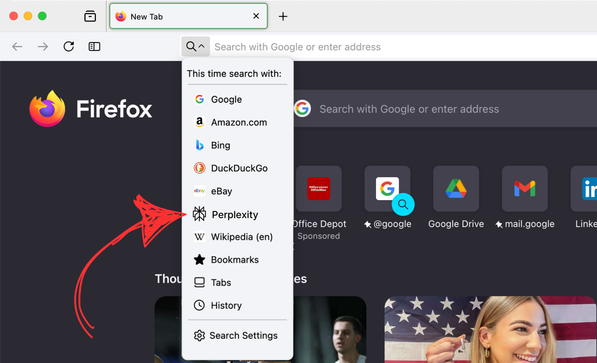Mozilla is taking a different route in the AI search race. Instead of launching a new browser built around artificial intelligence, it’s upgrading the Firefox experience people already know and trust. The company has officially integrated Perplexity, an AI-powered answer engine, as a new global search option inside Firefox, bringing conversational, citation-backed results to users everywhere.
This move marks one of the biggest shifts in how Firefox handles web searches. For decades, browsers relied on traditional engines like Google or Bing, which return long lists of blue links. With Perplexity now available, Mozilla is giving users a new way to search, one that feels more like chatting with a smart assistant than typing queries into a box.
Mozilla first tested the Perplexity integration earlier in 2025 across select regions, including the U.S., U.K., and Germany. The results were overwhelmingly positive. Users appreciated having the choice to access AI-driven answers without having to install new software or sacrifice their privacy. That response convinced Mozilla to make the feature globally available on desktop, with plans to roll it out to mobile devices in the coming months.

Once enabled, Firefox users will see Perplexity appear in the unified search button located in the address bar. From there, they can quickly toggle between Perplexity and other search engines like Google, DuckDuckGo, and Bing. Those who want to go all in can make Perplexity their default search engine through Firefox’s settings.
Unlike traditional search tools, Perplexity generates summarized answers with clear citations to original sources. Instead of ten blue links, users see a coherent, conversational explanation supported by references. This not only saves time but also makes it easier to verify information—a growing concern in the age of AI-generated content.
Mozilla’s decision to start with Perplexity wasn’t random. The AI startup has publicly stated that it doesn’t sell or share user data, aligning closely with Mozilla’s long-standing commitment to user privacy. By partnering with a company that prioritizes transparency, Mozilla can offer AI-powered search without compromising its values.
This integration is also a signal of what’s to come. Mozilla hinted that it may add other AI-driven search engines to Firefox in the future, letting users choose how they interact with the web. It’s a way of modernizing the browser without locking users into a single AI ecosystem.
Alongside the Perplexity announcement, Mozilla also rolled out new features that expand how users can personalize their browser. One of these is browser profiles, which are now available to everyone. The feature allows people to create separate profiles for work, school, or personal browsing—each with its own bookmarks, history, and extensions. It’s a simple way to switch between digital identities without mixing data or losing focus.
Additionally, Mozilla continues to experiment with visual search, powered by Google Lens. Those who set Google as their default search provider on desktop can now use Lens to search using images instead of text—another sign that Mozilla is looking to blend traditional and AI-driven search experiences seamlessly.
Taken together, these updates show that Firefox isn’t fading away in the age of AI browsers—it’s adapting. While others build entirely new products around AI, Mozilla is improving the one that already has millions of loyal users. The addition of Perplexity makes Firefox not just a browser, but a smarter search companion that balances innovation with privacy.
As AI continues to reshape how people find and consume information, Mozilla’s strategy stands out. It’s not about overwhelming users with new tools—it’s about giving them choice, control, and trust. And with Perplexity now baked into Firefox, the company may have just set the new standard for what an AI-powered browser should feel like.













